The State of Workplace Rights in England, Scotland and Wales 2025
A comprehensive survey revealing critical knowledge gaps about workplace rights among British workers. Based on responses from 1,172 working adults, our research uncovers insights that reveal a shocking lack of awareness among employees.
36%
do not know their rights during probation
40%
think tribunal proof is "beyond reasonable doubt"
39%
of hourly workers worked through breaks unpaid
YouGov, n=1,172, July 2025, weighted to UK working adults.
Day One Rights
Awareness of rights during probation
Our research reveals that workers in England, Scotland, and Wales lack a fundamental understanding of their workplace rights from day one of employment.
Many people in the UK start new jobs without a clear understanding of their basic employment rights. According to our 2025 survey, 36% of workers don’t know whether they have any rights during their probation period, while 24% incorrectly believe they don’t. Only 40% answered correctly — that day-one rights, including minimum wage, rest breaks, and protection from discrimination, apply from the first day of employment.
This lack of awareness leaves many new starters exposed to poor treatment, unpaid work, and unfair practices at the very beginning of their careers.
As an employee in Britain, you don't have any rights during your probationary period?
.png?width=1273&height=260&name=State%20of%20Workplace%20Rights%202025%20-%20charts%20(2).png)
Source: YouGov, July 2025, n=1,172
The two-year myth
The confusion doesn’t stop there. One in three workers (33%) wrongly believe that an employer can dismiss them for any reason within the first two years, and a further 22% are unsure. While it’s true that some unfair dismissal protections apply after two years, employees are still fully protected from discrimination, harassment, and other unlawful treatment from day one.
This widespread misunderstanding means many people underestimate the rights they already have — and may not challenge unfair behaviour because they assume it’s legal.
As an employee in Britain, you don't have any rights during your probationary period?
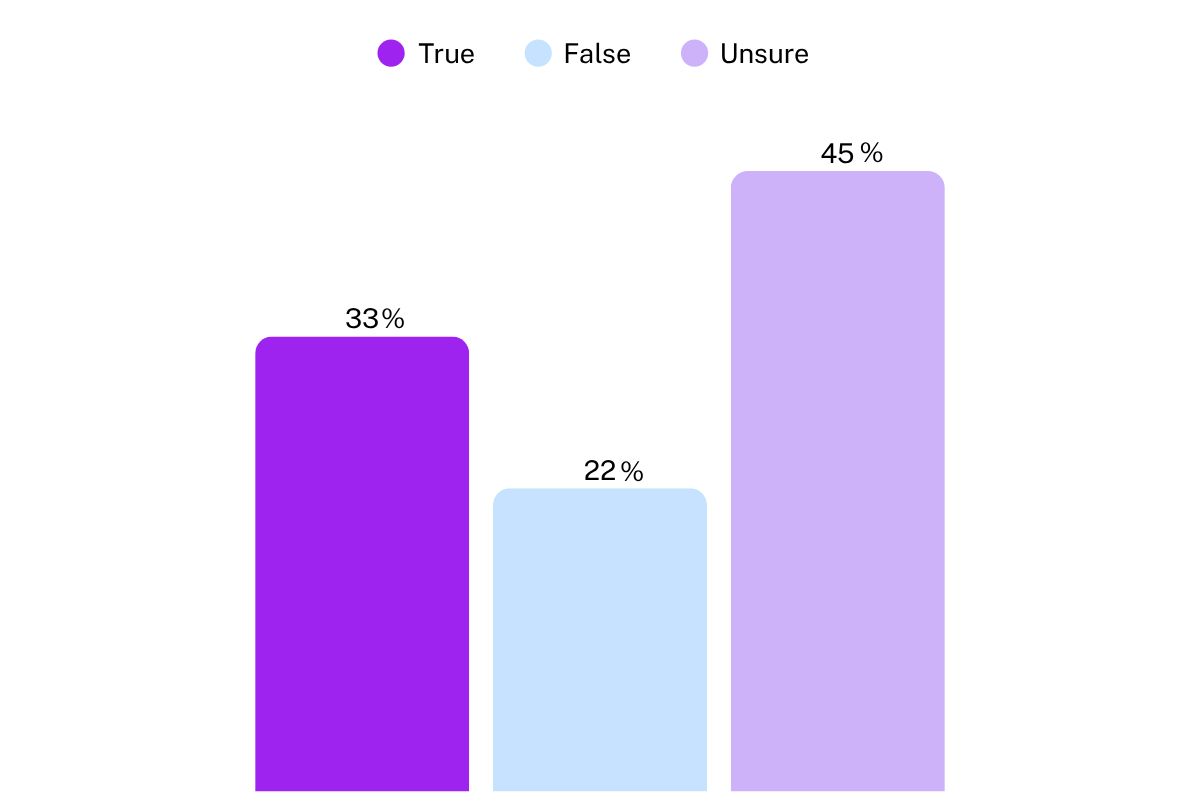
Source: YouGov, July 2025, n=1,172
Knowledge of the 9 protected characteristics
When it comes to knowing what those rights actually cover, awareness gaps become even clearer. The Equality Act protects nine characteristics — such as age, disability, sex, and race — yet 9% of respondents couldn’t name a single one. Among those who could, marriage and civil partnership was the least recognised, with only 44% correctly identifying it as a protected characteristic.
This shows that while most people understand broad issues like age or disability discrimination, few realise the full range of situations where the law offers protection from unfair treatment.
Which characteristics are protected under the Equality Act?
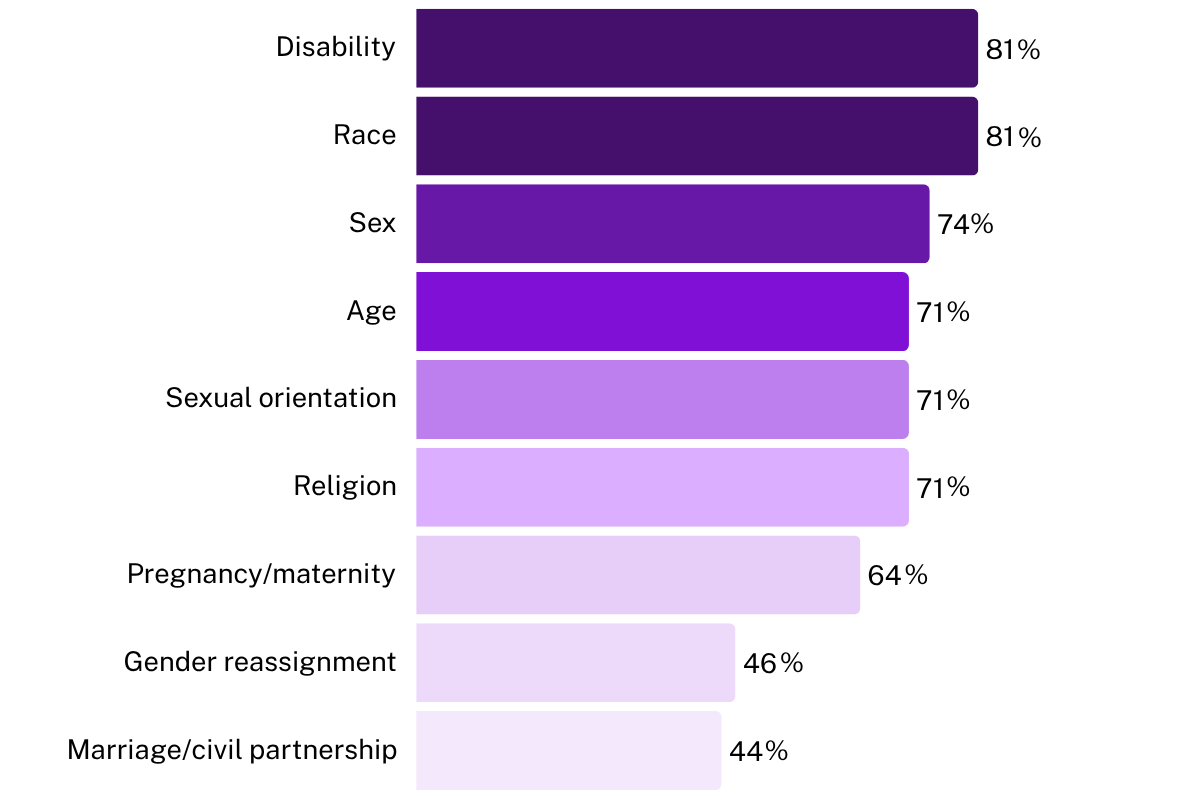
Source: YouGov, July 2025, n=1,172
Protected Characteristics under the Equality Act
- • Disability
- •Race
- •Gender reassignment
- •Sex
- •Sexual orientation
- •Marriage and civil partnership status
- •Pregnancy and maternity
- •Age
- •Religion or belief
Harassment and Disability
Recognising harassment - Gender Split
When asked about everyday examples of harassment, clear differences emerged between men and women. Our survey found that 75% of workers overall recognised that a colleague asking about their sex life counts as harassment — but only 69% of men agreed, compared with 80% of women. This gender gap suggests that many men may underestimate or normalise behaviour that makes others uncomfortable, highlighting a broader cultural blind spot around what constitutes inappropriate or unlawful conduct in the workplace.
The findings show that awareness of harassment isn’t evenly understood across the workforce. While most people can identify overtly offensive behaviour, subtler forms of harassment — like intrusive personal questions or unwanted attention — are still minimised by a significant share of employees. This gap in understanding can allow toxic behaviour to persist unchecked, particularly in workplaces without strong HR policies or training around equality and respect.
Do you think the following example would count as harassment under UK law? “A colleague asks you about your sex life.”

Source: YouGov, July 2025, n=1,172
Witnessing bullying counts as harassment
Understanding what qualifies as harassment remains inconsistent among UK workers. When asked if witnessing another colleague being bullied should count as harassment, only 33% of respondents agreed. The majority either said no or weren’t sure. This shows that most people still view harassment as something that only affects them directly, rather than recognising that being exposed to a hostile or intimidating environment also violates workplace rights.
This lack of awareness matters because the law protects not just victims of bullying or discrimination, but anyone who experiences or witnesses this behaviour at work. When employees don’t recognise these rights, incidents are less likely to be reported, and unhealthy workplace cultures can go unchecked. Greater education around what constitutes harassment — including indirect or observed behaviour — is key to ensuring all workers feel safe, respected, and empowered to speak up.
Do you think the following example would count as harassment under UK law? “You witness another colleague being bullied or intimidated at work.”
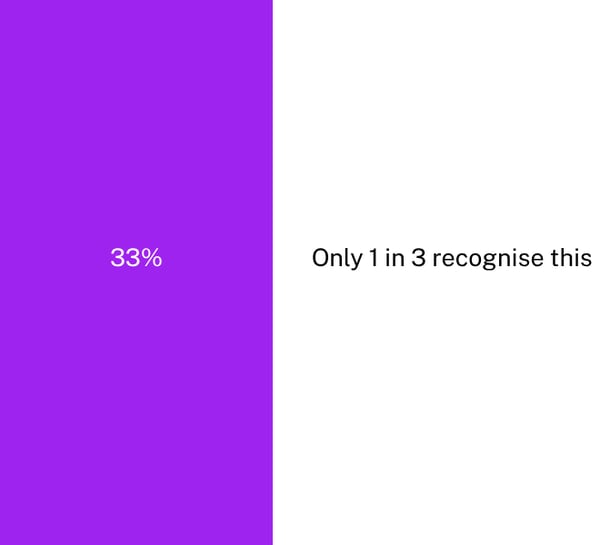
Source: YouGov, July 2025, n=1,172
Is depression a disability?
Understanding how mental health conditions are treated under UK law is still a major gap in workplace awareness. When asked whether depression counts as a disability under the Equality Act, only 45% of workers said yes. Awareness was slightly higher among younger adults aged 25–34, but significantly lower among older age groups and in manual or construction-based roles. This suggests that while mental health awareness has improved in recent years, many employees and employers still misunderstand how the law protects those living with long-term mental health conditions.
The Equality Act defines a disability as any physical or mental impairment that has a substantial, long-term impact on a person’s ability to carry out day-to-day activities — a definition that includes conditions like depression and anxiety. Yet the data shows that fewer than half of workers recognise this. That misunderstanding means many people experiencing poor mental health may not request reasonable adjustments or challenge discrimination, simply because they don’t realise they’re legally entitled to protection.
Under UK law, is depression considered a disability?

Source: YouGov, July 2025, n=1,172
Tribunal Process Myths
Early Conciliation Awareness
Before an employee can take a workplace dispute to an employment tribunal, they must first go through ACAS Early Conciliation — but awareness of this legal requirement is extremely low. Our survey found that only 5% of workers knew both the deadline and the duration of the process, while 38% had never heard of it at all. Awareness is particularly poor among younger workers, with over half of 18–24-year-olds (56%) saying they had no knowledge of the process. Women were also slightly less aware than men, showing how a lack of information cuts across demographics.
This lack of awareness means that many people facing issues like discrimination, unpaid wages, or unfair dismissal may miss their chance to act. The Early Conciliation process is designed to resolve disputes without going to tribunal — but it must be started within three months less one day of the incident. Missing that window can permanently close off legal options. These findings show an urgent need for clearer public education about how to begin a claim and the time limits involved, so workers can take informed action when their rights are breached.
Before starting an employment tribunal claim, you must go through a process called “ACAS Early Conciliation.” How familiar are you with this process?
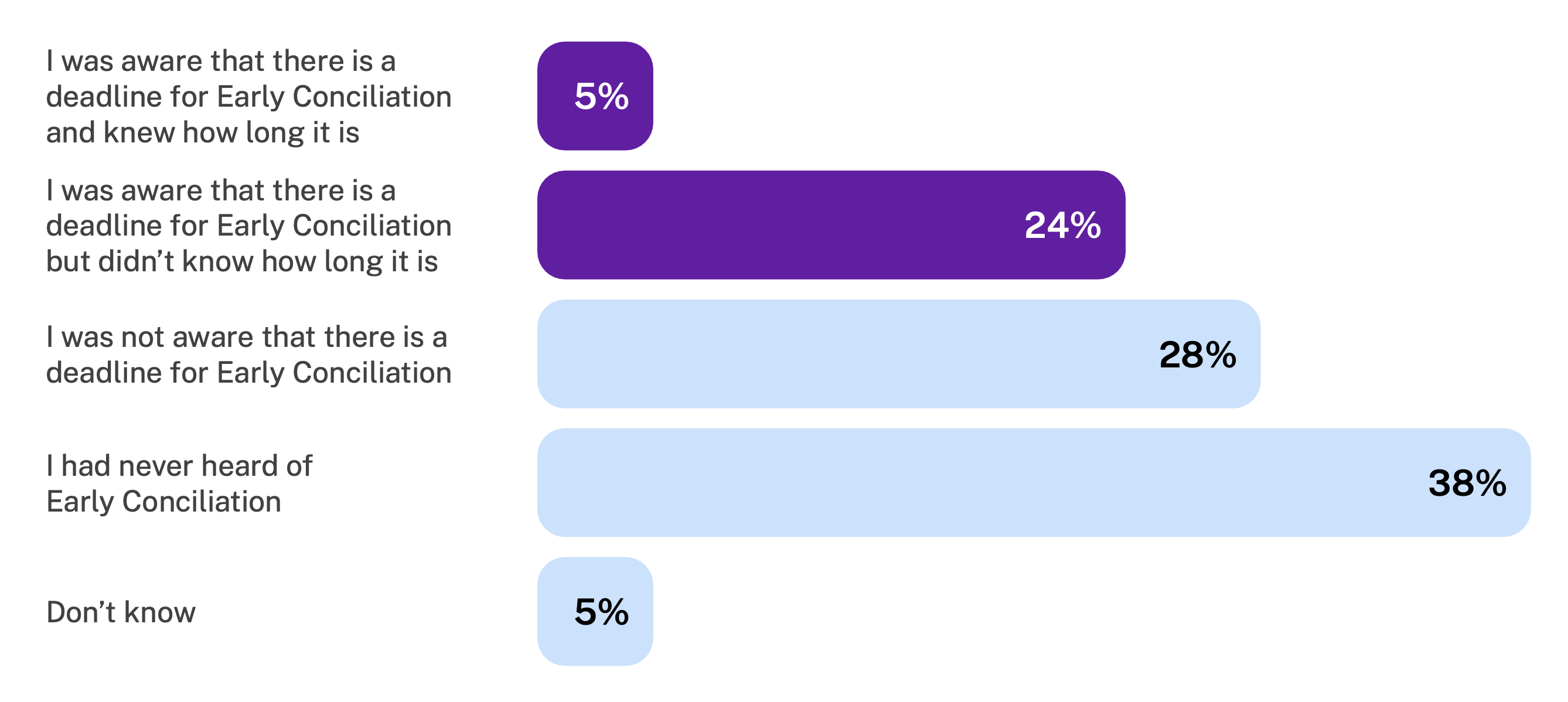
Source: YouGov, July 2025, n=1,172
Standard of Proof Belief
When it comes to taking legal action, many workers misunderstand how difficult it is to win an employment tribunal case. Our survey found that 40% of people believe they must prove their case “beyond reasonable doubt”, the strict criminal law standard used in courts. In reality, employment tribunals use the “balance of probabilities” test — meaning a claim only needs to be more likely true than not. The misconception is more common among women (43%) than men (38%), showing that even those most at risk of workplace discrimination may be discouraged from seeking justice because they think the burden of proof is too high.
This misunderstanding creates a real barrier to access. Workers who assume they need near-perfect evidence are far less likely to bring valid claims, even when they’ve been mistreated. By contrast, the balance of probabilities standard is designed to make justice more accessible and fair in employment disputes. The findings highlight how greater awareness of tribunal processes could empower more people to assert their rights and challenge unlawful behaviour at work.
Wage Theft
Types of Unpaid Work Among Hourly Workers
Wage theft — where employees aren’t paid for all the hours they work — is far more common than most people realise. Our survey found that 39% of hourly paid workers said they’ve worked through breaks without pay, while 35% have worked before or after their scheduled shifts without being paid. Another 28% reported working more than 40 hours a week without receiving the higher “time and a half” overtime rate they were entitled to. These figures reveal that nearly four in ten hourly workers have experienced at least one form of wage theft, most often through unpaid breaks or extended working hours.
The data highlights how everyday workplace pressures — like staying late, starting early, or skipping breaks — often lead to workers effectively giving away hours of labour for free. For those on lower incomes, even small amounts of unpaid time can have a serious financial impact. This kind of wage loss also tends to go unreported, as workers often fear retaliation or don’t realise that the practice is illegal. Improving education and enforcement around wage rights could help protect millions of people who are quietly losing money every week.
Thinking about your current or most recent job paid by the hour, which of the following have happened to you in the past 12 months?
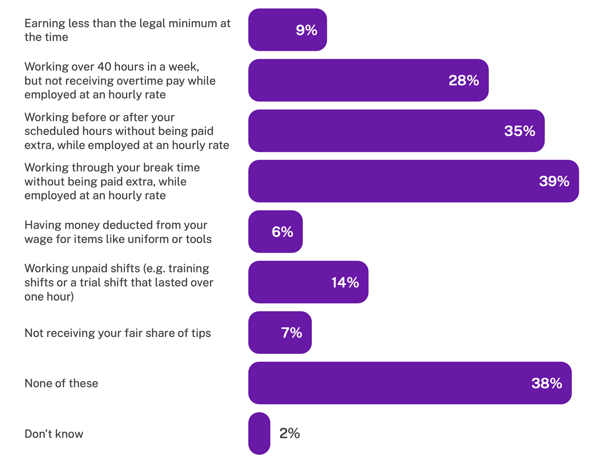
Source: YouGov, July 2025, n=1,172
Below Minimum Wage - Gender Split
Even when it comes to meeting the legal minimum, pay inequality persists. Our survey found that 10% of women reported earning below the National Minimum Wage on average, compared to 8% of men. While the difference may seem small, it represents a significant gender gap that reflects wider structural inequalities in the workplace — particularly for women in part-time, hourly, or casual roles. These findings suggest that wage theft and underpayment disproportionately affect women, reinforcing existing income and opportunity gaps.
This issue often stems from a mix of factors: inconsistent shift scheduling, unpaid overtime, and employers failing to correctly calculate minimum wage entitlements for variable hours. Because women are more likely to work in roles with fluctuating pay or zero-hours contracts, they’re also more exposed to these errors and abuses. Strengthening enforcement and transparency around pay — especially for hourly roles — is key to closing the gender wage gap and ensuring all workers receive at least the legal minimum for their time.
Thinking about your average hourly pay, have you ever earned less than the National Minimum Wage (after deductions)?

Source: YouGov, July 2025, n=1,172
Below Minimum Wage - Age Split
Young workers are the most likely group in the UK to be underpaid. Our survey found that 14% of 18–24-year-olds reported earning below the National Minimum Wage — compared to an overall average of around 9% across all age groups. This makes younger employees nearly twice as likely to be paid illegally low wages. As workers get older, the rate of underpayment drops significantly, suggesting that inexperience, lack of awareness, and limited job security play a major role in leaving younger people open to exploitation.
These findings point to a concerning pattern in entry-level and service-sector jobs, where younger workers often feel pressured to accept unfair pay or unpaid hours just to keep their position. Many don’t know how to check if their pay meets the legal minimum, or who to contact if it doesn’t. Raising awareness of wage rights among younger employees — and holding employers accountable for proper pay practices — is essential to breaking this cycle of underpayment early in people’s working lives.
Activity vs Violations
Conciliation vs Tribunal Scale
The gap between how many people experience workplace rights violations and how many take legal action is striking. Government data shows that in 2024–25, ACAS received around 124,000 Early Conciliation notifications, yet only 42,000 employment tribunal claims were filed during the same period. Of those, roughly 32,000 cases were closed — either settled, withdrawn, or decided. While these figures may sound high, they represent only a tiny fraction of the millions of UK workers estimated to face breaches such as unpaid wages, discrimination, or denied holiday each year.
The data suggests that most workers never make it to tribunal, with many stopping at conciliation or choosing not to pursue a claim at all. For every person who formally challenges their employer, countless others stay silent — often because they don’t know their rights, can’t afford legal support, or fear losing their job. These findings highlight a serious disconnect between the scale of workplace injustices and the limited number of cases that are ever resolved through official channels.
Data sourced from Ministry of Justice and ACAS 2024/25 annual statistics:
.png?width=1200&height=300&name=State%20of%20Workplace%20Rights%202025%20-%20charts%20(1).png)
Source: ACAS & Employment Tribunal statistics 2024-25
Law Changes
Timelines for strengthening Worker protections
The past two years have seen major updates to UK employment law designed to give workers stronger rights from day one. In April 2024, several new protections came into force — including the right to request flexible working from the first day of employment, extended redundancy protection for pregnant employees, and a new entitlement to one week of unpaid carer’s leave each year. Looking ahead, from April 2025, eligible parents will gain a new neonatal care leave right, allowing up to 12 weeks of paid time off if their baby requires hospital care.
Beyond these changes, the proposed Employment Rights Bill (expected in 2026) could introduce even broader reforms. Key proposals include day-one unfair dismissal rights, stronger action on zero-hours contracts, and new third-party harassment protections for employees. Together, these developments mark a shift toward greater workplace security and flexibility. However, awareness remains low — meaning many workers may not yet know they’re entitled to these new protections, and employers need clear guidance to comply.
Right to request flexible working from first day of employment
Enhanced protection lasting until 18 months after childbirth
Employees entitled to one week unpaid leave to care for dependents
Up to 12 weeks additional leave if child receives neonatal care
Major expansion of workplace protections
Get a Case Assessment
£149
- ✓ 1-hour consultation with UK legal expert
- ✓ Written summary of your case strength
- ✓ Understanding of likely outcomes and compensation
Methods and Press Pack
This survey was conducted by YouGov for Valla Ltd (July 24-29, 2025) with a representative sample of 1,172 working adults in England, Scotland, and Wales. Data is weighted to be representative of the British working population.